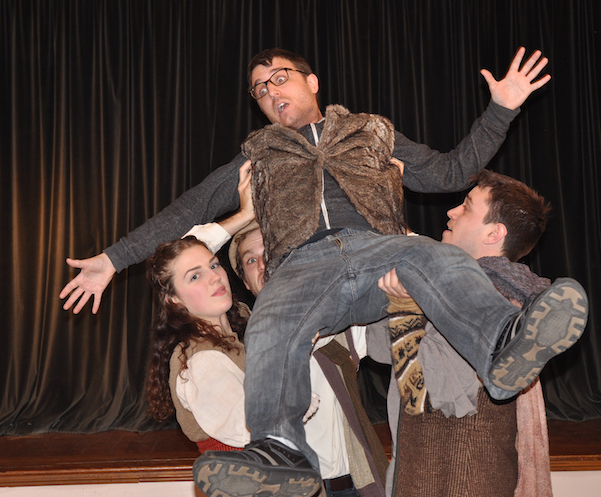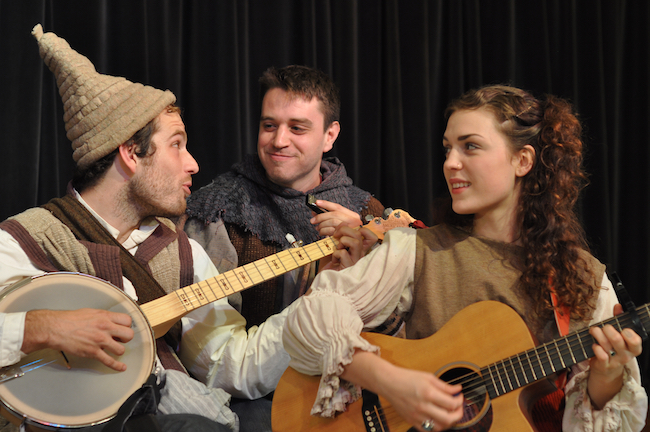Theater Review: “The Shepherds’ Singularity”—Time Travel Meets Christmas
The Shepherds’ Singularity‘s playful combination of science fiction and invention will surely incite thoughtful questioning and genuine wonder.
The Shepherds’ Singularity. Directed by Wanda Strukus. Music by Nate Tucker. Devised and performed by Come On Over Ensemble Theater at the Cambridge YMCA Theater, Cambridge, MA, through December 13.

Shepherd Tossing (left to right): Caitlin Rose, Christopher Martel, Matt Arnold (in air), Doug Dulaney.
By Ian Thal
There’s a popular science-fiction sub-genre regarding time travel: travelers from the present (or near future) journey back to witness or play a part in the life of Jesus of Nazareth. The most acclaimed application of the idea is Michael Moorcock’s 1969 novel Behold The Man. Moorcock’s novel is a deconstructive take on the ministry and crucifixion of Jesus. In contrast, Come On Over Ensemble Theater’s collaboratively devised piece The Shepherds’ Singularity reimagines the nativity through a reworking of the late 15th-century English mystery play The Second Shepherds’ Play, one of five texts in rhyming verse attributed to the anonymous but posthumously dubbed “Wakefield Master.”
The Wakefield Master’s original play dramatizes the shepherds’ visitation. The unselfconscious anachronisms of medieval and early modern art (as opposed to the oh-so intentional anachronisms of postmodern art) transform three shepherds, named Gib, Col, and Daw, into medieval English rustics who refer to local weather and the nobility along with Catholic saints and Christian doctrine. The trio becomes part of a comic misadventure that involves husband and wife sheep-thieves Mak and Gill. Almost as an afterthought to the comedy, an angel calls them to Bethlehem to pay tribute to the Christ-child.
As The Shepherds’ Singularity opens, the storyteller (Nick Osborne) rhetorically asks “how to tell the story?” The ensemble’s members, natives of our era, understand history as a linear sequence and not as a timeless collection of allegories and symbols. They decide to view the anachronisms of the original play as the inspiration for a time-travel story.
Sometime in the 21st century, mathematician and futurologist Gabriel Givens (Matt Arnold) holds forth at a community meeting about plans to establish a “technological center.” The locals, victims of a long period of economic hardship, are skeptical. An abstract image painted on a curtain hanging upstage suggests that this is a factory town gone dormant. Other techno centers have moved into the area and haven’t provided jobs for longtime residents. Gabriel talks about welcoming a “post-singularity future”—a hypothetical era that will come about with the development of an artificial intelligence that surpasses our own. The prophecy leaves the locals wondering if the whiz-bang changes will make humanity, as they know it, obsolete. Like the archangel for which he is named, Gabriel calls on them to have faith in the promise of the technological singularity.
Once the singularity becomes manifest, Gabriel finds himself transported to the medieval English setting, where Col (Doug Dulaney), Gib (Chris Martell), Daw (Caitlin Rose), and Gill (Nicole Howard) mistake him for the otherwise absent Mak. Meanwhile, the technological singularity has transformed a sheep (Poornima Kirby) into a hyper-intelligent creature capable of speech. The plot, at least in terms of the stolen sheep, unfolds much as it did in the original play; an angel (also Kirby) arrives and exhorts Mak, Gill, the shepherds, and the sheep to make their way to Bethlehem, this time by way of time travel. There is also a passage through strange realms that are either supernatural or created by the singularity. They arrive at the Nativity before the narrative returns to our contemporary (or near future) setting, where Gabriel continues to hold forth.
In their program notes, director Wanda Strukus and dramaturg Theresa Lang suggest that the Nativity constitutes a spiritual singularity that is analogous to the technological singularity. For the Christian who found faith, they argue, the experience of transcendence would have been unintelligible—it is an example of the shift Danish philosopher and theologian Søren Kierkegaard termed “the leap of faith.” But does it represent an event horizon beyond which knowledge becomes impossible? History did not end because of the birth, ministry, or death of Jesus of Nazareth—nor did history seem to be a mystery to those who lived in the centuries in which Christianity grew from a small messianic sect to a religion of Empire. By definition, miracles are inexplicable through rational explanation: but are they events that really constitute event horizons, even for the faithful? On the one hand, general relativity describes the event horizon as a boundary in space-time beyond which an outside observer cannot receive information. But physicists, through an application of quantum mechanics, no longer believe that event horizons function in so enigmatic a manner. Information, whether understood as matter or radiation, leaks out. Meanwhile, the very concept of a technological singularity is viewed skeptically by many technologists, futurologists, and cognitive scientists.
When artificial intelligence finally surpasses human smarts, will proponents of the faith in the singularity seem just as silly as Francis Fukuyama, who announced the “End of History” after the revolutions of 1989? Could it be that Gabriel is an unwitting prophet? Or is it possible that like another Gabriel—Gibreel Farishta of Salman Rushdie’s The Satanic Verses—the man has experienced a psychotic break and become delusional?
The Shepherds’ Singularity has many of the traits common to devised theater: it shows clear signs of being put together from a number of disparate elements: modern dialogue, passages of rhyming verse taken from the Wakefield Master’s original text, and songs composed for this production. But there’s also strong ensemble work: an eagerness to enlist the audience’s imagination in filling in the tantalizing narrative gaps as well as to wrestle with the piece’s speculative metaphors.

Musican Shepherds (Left to Right)
Christopher Martel, Doug Dulaney, Caitlin Rose.
Strukus makes good use of the proscenium stage at the Cambridge YMCA, but she has chosen to put more of the performance on the floor of the auditorium, increasing the performance’s intimacy. The interactive approach also makes the audience more aware of the use of space from scene to scene. She has also worked with the ensemble to develop some effective bits of physical tableaux, from the sleeping shepherds to the strange realm between Medieval England and ancient Bethlehem where Gabriel, Gill, and the storyteller play something that looks like a classic ’70s video game. As the technologically enhanced sheep, Kirby supplies physical comedy that steals the scene every time she trots on; she is also splendidly otherworldly as the angel. Arnold is always on the balls of his feet as Gabriel, as if he is leaning into the future he imagines. Of the shepherds, Martell’s Gib is the gruffest, but he is not above physical comedy, as when he mimes walking through fields of sheep dung. Dulaney’s Col is a wide-eyed, good-natured, and simple comic hero. Rose’s Daw suggests that she would rather be doing anything other than tending ruminants. Howard has a number of comic turns as the housewife who is happy to be the brains behind her missing husband’s petty criminal enterprise; but she is exasperated about being drawn into this otherworldly nonsense.
Nate Tucker was brought in early on during the development of The Shepherds’ Singularity as the production’s composer and musical director. The power of the musical numbers is proof that the time was well spent. All of the ensemble members either play instruments or sing, or both; early arrivals to the theater will be treated to an audience warm-up by the cast that makes use of American folk songs, like “Went Down to the River to Pray,” as well as Appalachian folk-inspired rock played both a cappella and on banjo, harmonica, hammer dulcimer, and guitars. Howard, Kirby, and Rose sing lovely harmonies together. Instrumental standouts are Martell on banjo and Kirby on the hammer dulcimer. Audiences might also grin at a brief quotation from Lou Singer and Hy Zaret’s scientifically inaccurate 1959 song “Why Does The Sun Shine?” (best known via They Might Be Giants’ 1993 cover version).
Strukus, doubling as a costume designer, uses various textures of fur, leather, felt, frayed cloth, and spandex to colorfully evoke the various eras. There is no attempt to stick closely to historical authenticity. Puppetry and mask designer Penny Benson pulls off an elemental magic: she shapes the face of the sheep out of a coarse burlap; she forms the red cardinal out of polygons, a nod to computer graphics; video game icons are fashioned out of pixels. Though the curving staircases that descend from the balcony to the stage are striking, scenic designer Bryant Cyr also keeps the set basic, using unadorned wood of crates and boards to create landscapes that the actors and audience can work their fantasies on. Allison Schneider meanwhile, uses lighting to fantastic comic effect during the video game sequence.
The Shepherds’ Singularity may not have the hefty budget or the audience numbers of what promises to be another creatively stagnant Doctor Who Christmas special, but its playful combination of science fiction and imagination will surely incite more thoughtful questioning and genuine wonder. And isn’t that what time-tripping should be all about?
Ian Thal is a playwright, performer, and theater educator specializing in mime, commedia dell’arte, and puppetry, and has been known to act on Boston area stages from time to time, sometimes with Teatro delle Maschere. He has performed his one-man show, Arlecchino Am Ravenous, in numerous venues in Massachusetts and Rhode Island. One of his as-of-yet unproduced full-length plays was picketed by a Hamas supporter during a staged reading. He is looking for a home for his latest play, The Conversos of Venice, which is a thematic deconstruction of Shakespeare’s The Merchant of Venice. Formerly the community editor at The Jewish Advocate, he blogs irregularly at the unimaginatively entitled The Journals of Ian Thal, and writes the “Nothing But Trouble” column for The Clyde Fitch Report.
Tagged: Come On Over Ensemble Theater, Nativity, The Shepherds' Singularity, holiday entertainment, science-fiction
